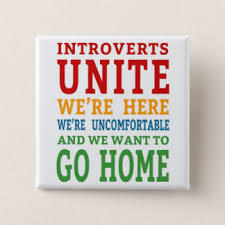Working in HR I have always been interested in personality, and how our personality aligns (or in some cases doesn’t align) with our work.
A popular personality tool is the Myers Briggs Type Indicator. I have done this tool many times over the years as an individual and in team settings, and I’m always fascinated as to the type of my co-workers.
The Myers Briggs Type Indicator (MBTI)
The MBTI is a personality tool that is used across the world to give people insight into their own personality and that of others. It’s only when you understand yourself that you can be your very best. When you understand the personality of others, you can interact with them in a way that helps them best receive your message.
The MBTI has four dimensions or dichotomies:
- Source and direction of energy: Extraversion vs Introversion (E vs I)
- Where we receive our information from: Sensing vs Intuition (S vs N)
- How we process information: Thinking vs Feeling (T vs F)
- How we implement the information we process: Judging vs Perceiving (J vs P)
Whilst people can have features of both poles within each dimension, they typically have a preference for one over another.
All the combinations of our preferences across the four dimensions yield 16 different personality types:

Extraversion vs Introversion
Extraverts usually get their sources of energy from the outer world, whereas for introverts it is the other way around. If you are an Extravert, you prefer to direct your energy to deal with people, situations, things, or “the outer world”.
Introverts get their energy from their own inner world. You prefer to direct your energy to deal with information, ideas, explanations or beliefs.
Consider your preferences when you are at a big party. Are you the person that jumps right in and introduces yourself to everyone? Or do you prefer to hang back in a smaller group, perhaps on the perimeter of the party and see what’s going on?

Sensing vs Intuition
People who are Sensing rely on concrete, actual information. You prefer to deal with facts, to have clarity, what you know, or to describe what you see.
People who use Intuition rely on their own conception about things based on their understanding of the world. You prefer to deal with ideas, to generate new possibilities or to anticipate what isn’t obvious.
For example, if you are asked what you see when you sit on a beach, if you are a sensing type you might say “I see sand with seaweed on it, and there are rocks about 200 metres to the left.” An intuitive type might say “I see a calm expanse with water that makes me want to go and explore.”
Thinking vs Feeling
The Thinking preference means an individual makes decisions based on logical reasoning, and is less affected by emotions and feelings. You prefer to decide on the basis of objective logic, using an analytic approach.
For those that have the Feeling preference, the individuals’ base for decision is mainly emotions and feelings. You prefer to decide using values – i.e. on the basis of what or who you believe is important.
An example might be that a Thinking type will follow a timeline to implement a change and follow a checklist of things to do. If it is delivered on time with the boxes checked it is a success. With the same project, a Feeling type may invest more time in ensuring that people impacted by the change are comfortable with it, understanding that their buy in is very much part of the success of the change.
Judging vs Perceiving
People who are dominant in the Judging preference perceive the world as an ordered structure that follows a set of rules. If you prefer your life to be planned and well structured then your preference is for Judging (this is not ‘Judgmental’ which is different).
People who are dominant in the Perceiving preference see the world as structured, and that can take various outcomes and forms. You prefer to go with the flow, to maintain flexibility and respond to things as they happen.
For example, when you go on a holiday, do you pre-plan everything in advance? Do have a list of things that you must tick off? Places you must visit, and the days you will visit them? Do you make lists of what you need to pack? Or do you prefer to turn up and see what happens depending on how you’re feeling?
My MBTI Type
My personality type is an INFP.
That means that my preferences are:
- Introversion (I)
- Intuition (N)
- Feeling (F)
- Perceiving (P)
The desription of an INFP is “Idealistic, loyal to their values and to people who are important to them. Want an external life that is congruent with their values. Curious, quick to see possibilities, can be catalysts for implementing ideas. Seek to understand people and help them to fulfill their potential. Adaptable, flexible, and accepting unless a value is threatened.”
To find out about all of the MBTI personality types, click here:
http://www.myersbriggs.org/my-mbti-personality-type/mbti-basics/the-16-mbti-types.htm
What does this mean for a working from home career?
Knowing your preferences is critical in understanding how you can be effective.
There are no right or wrong preferences – we are who we are. But we do need to understand them to ensure that we can compensate for the preferences that may hold us back to being successful in our business.
I’ll use myself as an example. For me, an online business is perfect for my introverted tendencies. I am very happy to work all day long without interruption from anyone else, and I don’t need the company of others, most of the time. However, because I am perceiving (rather than judging) I have to make more of an effort to be structured. I know this about myself, so I have to work harder at this aspect in order to be successful. For me, this might mean that I need to make a list of things to do each day or each week, and systematically work through them. Otherwise I am likely to go off on a tangent that I find interesting, or get distracted by other things.
Because I rely on feeling over thinking, my preference might be to want to market something that I like or find interesting, rather than something that I can tangibly measure and therefore know will drive traffic. So I need to make a conscious effort to use data to make the most effective business decisions.
Can your preferences change over time?
Your preferences typically don’t change over time. The good news is that you can easily learn to use your other preferences. Most people I have worked with would never know that my natural preference is perceiving over judging because I am very organised when it comes to work, simply because I have to be in order to succeed in a structured work environment. Outside of work is totally a different story!
When it comes to introversion and extraversion, I know many introverts who have developed their extraverted side because their jobs rely on being in large groups of people, facilitating groups, presenting in front of large audiences, and bringing people together. Unless they tell me I would assume they are extraverted. Whilst it is not their preference, they have honed those skills over a long period of time out of necessity.
Take the MBTI to understand your type
Take a free version of the MBTI here if you’re interested to find out your type:
https://www.16personalities.com/free-personality-test
You don’t need to provide any personal information, so you won’t be spammed.
A challenge for you!
Considering your personality type, set yourself a goal to improve your effectiveness in 2018, and to help you with your career from home.
If you need some ideas about building your online career from home, read more here.
Here’s to a successful 2018 to you and your family!!
Please leave your comments and feedback below. If you have any questions please ask and I’ll be happy to help.

What a great tool. I hadn’t heard of this one before. I have done something called Enneagram a long time ago and that was a good way to determine type.
Whilst I’m yet to do this MBTI tool, I think based on the description I’m definitely introverted rather than extraverted. I think I’m very much suited to the work that I do which is quite independent and doesn’t need me doing big presentations anymore.
I think I’m super organised so that might make me a J? I’ll take the test and I’ll let you know! Thanks
Hi Susie, go take the test and let me know! You might still be super organised and still be a “P” like me. It’s a skill that I’ve developed over many years but does not come very naturally to me outside of a formal work context. Make sure you check back in and let me know.
Hi Melissa,
Before I took the test I already knew I was an INFP just like you are. What I found as a pleasant surprise was that I was specifically an INFP-A. That A was the exclamation point to the INFP.
I am considering going for one of the Premium packages to understand myself better in order to perform better.
It is uncanny that I know that I need to work on discipline and build better habits. I make starts in this direction but never follow through. At least I know what I must work at just like you have in order to do better in my business.
Thanks for writing this post.
Edwin